#long18thcentury
Text
ECF journal Summer 2022 issue
Read ECF at Project MUSE!
Articles:
Pity the Fool: Satire, Sentiment, and Aristocratic Vice in George Colman's The Suicide
by Eric Parisot, pp. 393-414
Breakfast with "Her inky Demons": Celebrity, Slavery, and the Heroine in Late Eighteenth-Century British Fiction
by Ruth Scobie, pp. 415-440
"Nursed under his own Eye": Co-Nursing Fathers and the Spectacle of Breastfeeding in the British Romantic Period
by Virlana M. Shchuka, pp. 441-469
Reflections: "Eccentric Connections: Toward a Decolonial (Digital) Book History," by Stephen H. Gregg, pp. 471-482
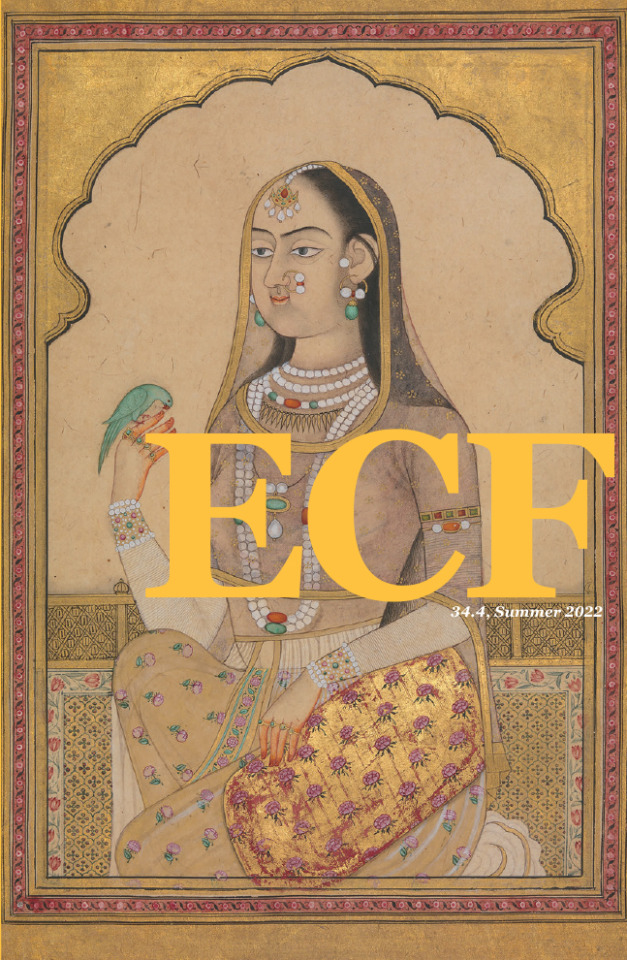
1 note
·
View note
Text
The Rape of the Lock pt. I
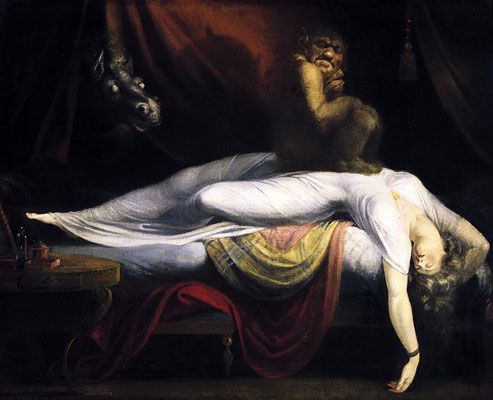
“At this, the blood the virgin’s cheek forsook, / A livid paleness spreads o’er all her look; / She sees, and trembles at the approaching ill, / Just in the jaws of ruin, and Codille” (Pope, lines 89-92, pp. 516-517).
This excerpt is from Canto 3 of Alexander Pope’s “The Rape of the Lock.” In this scene, Belinda is playing a game of cards with the Baron and a host of other men, and loses.
While the scene is from a simple card game, the language used by Pope connotes a deeper, more sinister meaning and tone. The descriptions of Belinda’s state of mind and appearance here act to foreshadow the rape that occurs shortly after. The strength of the language goes beyond the card game, or even Pope’s attempts at making light of the symbolic rape on the following page. As a female reader in the twenty-first century, I was struck by the image of a blood-stained virgin in these lines, especially considering the light-hearted circumstance of a game of cards. Of course Pope’s purpose in using the strong images and language is likely to garner a laugh at Belinda’s absurdity, or an eye roll at the “overly dramatic” nature of females. However, as a female, I felt myself empathizing with Belinda’s feelings of fear, nervousness, and embarrassment at her loss. Because, just like the Baron taking Belinda’s lock of hair is not simply that, the card game is not just a card game. It represents the war between genders, and women’s desire to be victorious over the socially constructed roles they’ve been placed in. So, Belinda’s loss of the game of Codille represents the loss of autonomy and rights experienced by 18th-century females. Or perhaps not the loss of, but rather a lack of those things since women never had them to begin with, just like Belinda was fated to lose the card game and her lock of hair; men had sole power, even over women’s bodies.
#Alexander Pope#Romanticism#Rape of the Lock#Females#Feminism#misogny#long18thcentury#Henry Fuseli#The Nightmare#Gender wars#Equality#toxic masculinity
9 notes
·
View notes
Text
The Rape of the Lock pt. II
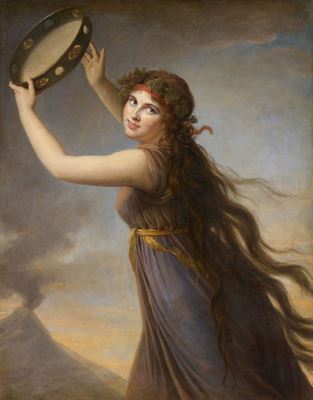
“Her eyes dejected and her hair unbound. . . / Belinda burns with more than mortal ire, / And fierce Thalestris fans the rising fire” (Pope; lines 90, 93-94; pp. 520).
These lines are from Canto four of Pope’s “The Rape of the Lock.’’ Belinda is preparing for an internal monologue, followed by her outward speech to the Baron. She is outraged by the Baron forcefully cutting a lock of her hair and keeping it for himself.
The image of Belinda with her hair unbound stayed with me during and following the reading. Not only does it symbolize her loss of virginity, chastity, and purity, but it represents her new identity-- one that was forced on her by the Baron. She is now a victim of rape, however, this image of her hair flowing unbound in tresses coupled with her dignified anger at the Baron reminded me of a woman untamed by society. In my reading, the Baron represented society forcing women into pre-determined roles to silence them. Belinda’s hair, while overtly representing virginity and “purity”, my twenty-first century lens lent me to view Belinda and her hair as a symbol for femininity, sexuality, and personhood. With this reading, I found that even in their individualism and femininity (unbound hair), women bear the mark of a male-centric society. Belinda’s hair was unbound because of the rape Belinda endured from the Baron. Belinda’s anger and unbound hair are a result of male ego and dominance, yet they are also symbols, if one chooses to interpret it this way, of a woman breaking free of the dominance, the misogyny, the silencing, against women. But even in that, Belinda is marked by those things because the Baron saw himself as entitled to Belinda’s body. All women can relate to these experiences: being silenced, harassed, assaulted, talked over, ignored, misrepresented-- all of these are devastatingly true to the female experience. In the face of these experiences, women, like Belinda, choose to unbind their hair, to become angry, and to speak up and out against toxic masculinity and men who feel entitled to the bodies of women. We use our circumstances as a force against our perpetrators, and that, to me, is demonstrated through Belinda and her unbound hair and anger.
#Alexander Pope#Women#Femininity#Romanticism#Feminism#Unbound Hair#Misogyny#Female sexuality#entitlement#long18thcentury#elisabeth louise vigee le brun#The Portrait of Emma Lady Hamilton#anger#Identity
7 notes
·
View notes
Text
Pleasure Derived From Objects of Terror
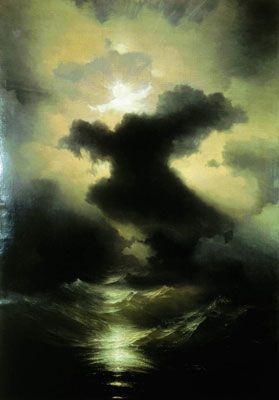
“Hence the more wild, fanciful, and extraordinary are the circumstance, of a scene of horror, the more pleasure we receive from it; and where they are too near common nature, though violently borne by curiosity through the adventure, we cannot repeat it or reflect on it, without an overbalance of pain” (Anna Letitia Barbauld & John Aikin, 521).
This excerpt occurs when Barbauld is commenting on the human imagination and the appeal and draw to horror.
I connected to this excerpt because it communicates my feelings on horror precisely. The outrageous, not-so-realistic elements of horror are bearable for me, and even in some cases, enjoyable. I’ve found that I don’t find these instances of fanciful horror as striking or hard to stomach as realistic horror. Barbauld’s assumption that “we cannot repeat it or reflect on it, without an overbalance of pain” felt personal. When the veil between reality and horror becomes thin, almost invisible, I feel an intense desire to run the other direction. Plausibility is, in many respects, more terrifying than any number of demons, monsters, ghosts, and ghouls. When reading Barbauld, it became clear that horror functions as ultimate escapism, because not only is there the immersion that occurs in all art genres, but there is a suppression of emotion and feeling outside of fear. The fear is only palatable and tolerable when it exists so far outside the realm of reality, that it is impossible to draw comparisons to one’s life. Barbauld’s argument gave me a deeper understanding of and appreciation for horror and those that find pleasure, even comfort, in its dark embrace.
#Anna Letitia Barbauld#Gothic#Horror#Terror#Fear#Escapism#Reality#Romanticism#long18thcentury#Sublime#Emotions#ivan aivazovsky#Chaos
5 notes
·
View notes
Text

“Press’d by the Moon, mute arbitress of tides, / While the loud equinox its power combines, / The sea no more its swelling surge confines, / But o’er the shrinking land sublimely rides” (Charlotte Smith, lines 1-4, pp. 57).
These lines are from Smith’s “Written in the Church-Yard at Middleton in Sussex.” The sonnet is dark in tone, as Smith writes of the graveyard in the Sussex church being washed away by the sea.
The image of the moon and sea as a combined destructive force in the opening lines of this sonnet are vividly painted by Smith. Her melancholy demeanor is mirrored by the raging sea, breaking free of its confines to wash away the Sussex graveyard. The word “sublimely” in line four stood out to me as a representation of the sea’s sheer magnitude and power. It functions as the protagonist of the sonnet, taking on a mind of its own as it “sublimely rides” the land, which in turn, shrinks. As I read these lines, it became apparent that the sea might be a representation of depression and melancholy- the sea spills out of its confines and boundaries and forces itself onto the land, similar to the way melancholy and depression seep into every facet of one’s life, without concern for maintaining order or boundaries. Additionally, in my reading, the sea represented the internal struggle of women in the long 18th century to break free from societal expectations and gender roles. This sonnet spoke to me the most out of all of them because, while it provides a clear image of the sea washing away the graves in Sussex-- something tangible-- it also functions as a metaphor for a number of societal struggles if one chooses to read it that way. The images in this sonnet break boundaries and confines, similar to the sea within the lines.
#Charlotte Smith#Written in the Church-Yard at Middleton in Sussex#Romanticism#Depression#Melancholy#Sea#Boundaries#Social confines#Darkness#Moon#Sublime#ivan aivazovsky#long18thcentury
2 notes
·
View notes
Text
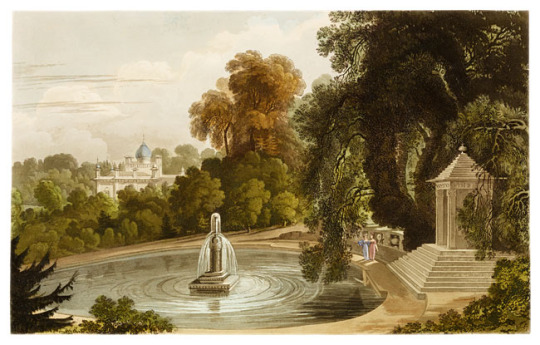
“‘All that is very well,’ answered Candide, ‘but let us cultivate our garden’” (108).
This is the final line in the novel; Candide and company have settled in a quiet garden area that seems to be in the middle of nowhere. They’ve overcome a great deal of trials, many of which were self-inflicted in a roundabout sense. Yet they somehow all weathered through and made it to the other side in one piece. Pangloss is recounting the most significant trials to Candide, who replies with the above quotation.
This quote struck me when reading it as a call to action of sorts. It seems as though Voltaire wants readers to be more present, to focus on their current surroundings, instead of the things they cannot control. I also felt that Candide has finally reached his breaking point- his response to Pangloss was a far cry from his earlier admiration and awe of who Pangloss was for him as a mentor. He no longer takes everything Pangloss says at face value and instead learns that obsessing over past, present, and future trials is obscelete as it won’t change the outcome. Candide’s call to tend to our gardens is a call to stay present.
1 note
·
View note
Text
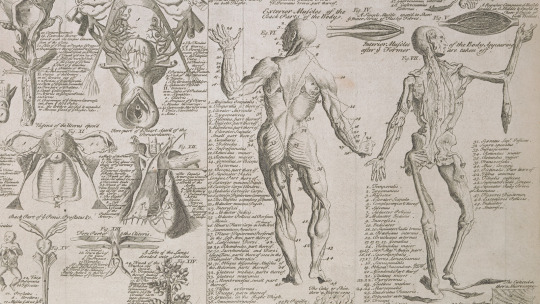
“‘A Republican must be greatly pleased with most of these books, which are written with a spirit of freedom. ‘Yes,’ answered Pococurante, ‘it is noble to write as one thinks; this is the privilege of humanity” (87).
Candide and Martin are in the home of Lord Pococurante, a man of science. He is a man of wealth- he has paintings by Raphael, and shelves upon shelves of renown English literature. Martin makes note of the collections and how much pleasure they must bring to someone knowing they are written “with a spirit of freedom.”
This quotation, while not a social commentary or satirical reference, stood out to me because of what it suggests about writers and writing. The act of writing, according to Voltaire in this excerpt, should be considered a privilege, especially when writing truth. I also love how Martin brings focus to the freedom that writing brings. Writing serves the writer as much, if not more than it serves the readers. The ability to write with reckless abandon, to write truth as one perceives it, to give voice to the inner demons; these are all why writing is such an integral part of human nature. I have not stopped considering this quote since I first encountered it. It seems as though Voltaire is suggesting that the experience of writing is not meant to be something that restricts or constrains, but is meant to alleviate, to bring relief, and to create freedom. I think it’s difficult to consider writing as freedom when writing papers for classes and writing for educational purposes, however, it is still, at the very least, experiential and still, as Voltaire writes “the privilege of humanity.”
0 notes
Text
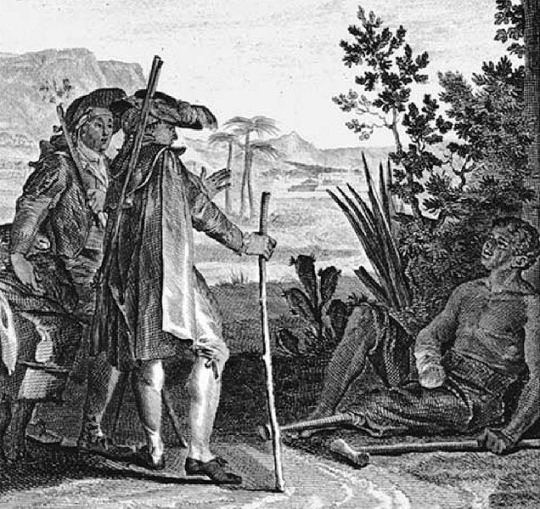
“Dogs, monkeys, and parrots are a thousand times less wretched than I. The Dutch fetiches, who have converted me, declare every Sunday that we are all of us children of Adam—blacks as well as whites. . . If these preachers tell the truth, we are all second cousins. Now, you must agree, that it is impossible to treat one’s relations in a more barbarous manner” (60).
Candide and Cacombo are traveling to Suriname in search of Cunegonde. Many of their sheep die along their journey. This passage takes place right before Candide is taken advantage of (again) by the skipper who steals from him. Along their journey, Candide and company come across a black man in tattered garments, with a missing leg and hand, and Candide is aghast at the state of the man.
This was the point at which the novel took a severe turn. It is evident in this passage that at the heart of the novel is Voltaire’s desire to push against the overt racism and discrimination against “The Other,” in this case, black people. Everything in the novel thus far has been satirical and therefore incredibly exaggerated. Things like people dying and resurrecting, or casually committing mass murder. Yet this passage is not a satire or a dramatized version of history or social norms. It is the clear-cut truth of what was happening, which was blacks being discriminated, lynched, purchased, sold, beat, torn limb from limb; Voltaire’s assertion that “[animals] are a thousand times less wretched than [African individuals]” is not to be taken lightly. The reality seems like it should be satire. It is so blatantly wrong, it seems like fabrication. Voltaire brings the issue of racism and slavery to the novel to show how deeply wrong and absolutely asinine it is to treat humans the way people of color were, and still are treated. This passage also calls attention to the hypocrisy of religious entities who claimed that everyone was a descendant of Adam, while treating black people worse than stable animals fed from a trough. This passage struck a cord with me, even considering today’s social climate and the overt racism that still perpetuates the nation and the world. Voltaire brings Candide; the man who, even after undergoing numerous trials, believes in the notion of “best of all possible worlds,” face to face with slavery; the act of one human asserting dominance over another by purchasing and selling them like items sold at a store. Candide, in his optimistim to a fault, abandons his beliefs after the encounter with the man embonded and in the possession of a white man. Candide can not fathom the lack of humanity displayed in the picture of the man who had limbs cut off during work in the cane fields and only gets a change of clothes twice a year. Voltaire’s social commentary from the perspective of an African slave is arguably the most powerful in the entire novel.
#voltaire#candide#slavery#racism#whitesupremacy#black and white#long18thcentury#loss of humanity#power struggle#humanity#dignity#respect#optimism
0 notes
Text
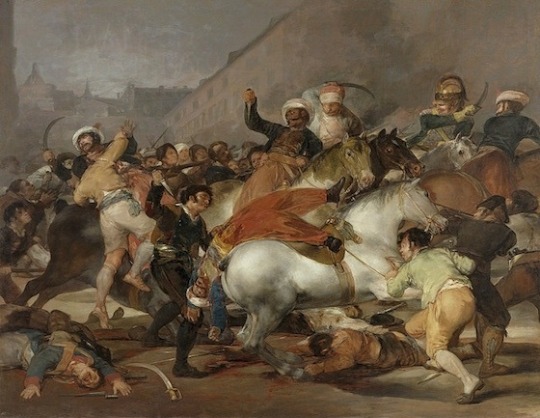
“Next to jewels and gold we were the most valuable things he had. I was witness to such a battle as you have never seen in your European climates. The northern nations have not the heat in their blood, nor that raging lust for women, so common in Africa” (Voltaire 30-31).
This quote appears in chapter eleven when the Old Woman is telling Candide and Cunegonde her story in response to Cunegonde’s assumption regarding the Old Woman’s lack of misfortune. She explains that after her fiancé dies by chocolate consumption (?), she and her mother get ambushed on a ship and taken captive by a crew of misogynistis.
The first aspect that stood out to me about this quote was the visceral imagery. The comparison of the women to gold and jewels draws a clear image for the reader, and brings them into the immediacy of Voltaire’s critique of misogyny and aristocracy in the same vein. Additionally, Voltaire uses the term “battles” to give voice to the Old Woman’s account of how the men aboard the trip treated her and her mother like property. They were commodities to be conquered or won in battle, they were definitely not humans with autonomy over their bodies or lives. Through the war image, Voltaire also furthers his critique of war fought unnecessarily in the long 18th century. Lastly, the description of heated blood and raging lust is a poignant one. Voltaire draws these parallels between Africans and bloodlust for women. It is unclear to me if Voltaire is critiquing societal characterization and treatment of Africans at the time as animalistic, or if he is the one characterizing them as such. I know a large portion of this novel functions as a satirical critique of society and social constructs, however, I am not yet well-versed in Voltaire’s perspective on all people groups to determine where the critique lies.
#candide#voltaire#racisim#misogny#whitesupremacy#sexism#rape#gold#long18thcentury#spoilsofwar#war#critique#satire
0 notes